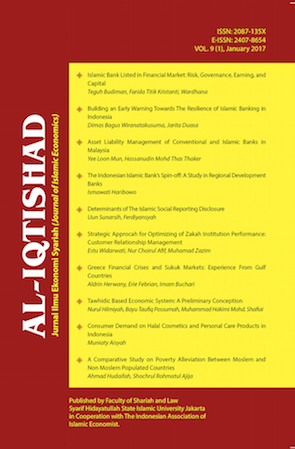Determinants of The Islamic Social Reporting Disclosure
DOI:
https://doi.org/10.15408/aiq.v9i1.3771Keywords:
Islamic social reporting, sukuk, company’s size, profitabilityAbstract
The issue of corporate responsibility was a warm up for discussion. This study aimed to analyze the influence of company issuing sukuk, size, and profitability on the disclosure of Islamic Social Reporting. This study uses secondary data obtained through the site www.bapepam.go.id and www.idx.co.id by using purposive sampling. The results showed that only size that affect the disclosure of ISR, so the larger the total assets of the greater disclosure of Islamic Social Reporting. Sukuk issuance has no effect because the ownership structure of companies in Asia, including Indonesia tends to family ownership concentration. Profitability has no effect because the company has a perspective that is different to the Islamic Social Reporting.
References
Abu-Tapanjeh, A. M. (2009). Corporate governance from the Islamic perspective: A comparative analysis with OECD principles. Critical Perspectives on Accounting, Vol. 20 (5): 556–567.
Anggraini, F. R. R. (2006). Pengungkapan Informasi Sosial dan Faktor-Faktor yang Mempengaruhi Pengungkapan Informasi Sosial dalam Laporan Keuangan Tahunan ( Studi Empiris pada Perusahaan-Perusahaan yang terdaftar Bursa Efek Jakarta ). In Simposium Nasional Akuntansi 9 Padang (pp. 23–26).
Claessens, S. & J.P.H. Fan. (2002). Corporate Governance in Asia : A Survey. International Review of Finance, Vol. 3 (2): 71–103.
Freeman, R.E. & J.M. Vea. (2001). A Stakeholder Approach to Strategi Management. Working Paper, 01-01: 1–32.
Haniffa, R. (2002). Social Reporting Disclosure: An Islamic Perspective. Indonesian Management & Accounting Research. Vol. 1 (2): 128–146.
Haniffa, R. M. & T.E. Cooke. (2005). The impact of culture and governance on corporate social reporting. Journal of Accounting and Public Policy, Vol. 24: 391–430.
Hossain, M.. et.al. (2006). Corporate Social and Environmental Disclosure in Developing Countries: Evidence from Bangladesh. Procedings of the Asian Pacific Conference on International Accounting Issues. Hawaii.
Hossain, M., & H. Hammami, H. (2009). Advances in Accounting , incorporating Advances in International Accounting Voluntary disclosure in the annual reports of an emerging country : The case of Qatar. International Journal of Cardiology. Vol. 25(2): 255–265.
Jensen, M. C. & W. Meckling. (1976). Theory of the Firm: Managerial Behaviour, Agency Costs y Ownership Structure. Journal of Financial Economics. Vol. 3(4): 305–360.
Khasharmeh, H.A. & A.M. Desoky. (2013). On-line Corporate Social Responsibility Disclosures : The Case of the Gulf Cooperation Council ( GCC ) Countries. Global Review of Accounting and Finance. Vol. 4 (2): 39–64.
O’Donovan, G. (2015). Environmental Disclosures in the annual Repot : Extending the applicabillity and Predictive Power of Legitimay Theory. Report Information from Proquest, (March): 14–17.
Othman, R. et.al. (2009). Determinants of Islamic Social Reporting Among Top Shariah -Approved Companies in Bursa Malaysia. Research Journal of International Studies. Vol. 12 (12): 4–20.
Sekaran, U. & R. Bougie. (2010). Research Methods For Business: A Skill Building Approach. New Jersey: John Wiley & Sons, Ins.
Sembiring, E. R. (2005). Karakteristik Perusahaan dan Pengungkapan Tanggung Jawab Sosial: Study Empiris pada Perusahaan Yang tercatat di Bursa Efek Jakarta. In Simposium Nasional Akuntansi 8 (pp. 379–395).
Setyorini, C. T. & Z. Ishak. (2012). Corporate Social and Environmental Disclosure : A Positive Accounting Theory View Point. Internatioanl Journal of Business and Social Science. Vol. 3 (9): 152–164.
Triyuwono, I. (2012). Akuntansi Syariah: Perspektif, Metodologi, dan Teori (Edisi Kedua). Jakarta: Rajawali Press.
Yuliana, R. et.al. (2008). Pengaruh Karakteristik Perusahaan Terhadap pengungkapan Corporate Social Responsibility (CSR) dan Dampaknya terhadap Reaksi Investor. Akuntansi Dan Keuangan Indonesia. Vol. 5 (2): 246–276.

